

Tryst with destiny. Jawaharlal Nehru's Tryst with Destiny speech Speech[edit] Long years ago we made a tryst with destiny, and now the time comes when we shall redeem our pledge, not wholly or in full measure, but very substantially.
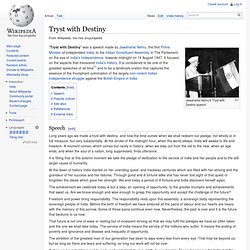
At the stroke of the midnight hour, when the world sleeps, India will awake to life and freedom. A moment comes, which comes but rarely in history, when we step out from the old to the new, when an age ends, and when the soul of a nation, long suppressed, finds utterance. Emiliano Salinas: A civil response to violence. United Nations Secretariat. Proxy war. A proxy war is a conflict where third parties fight on the behalf of more powerful parties.
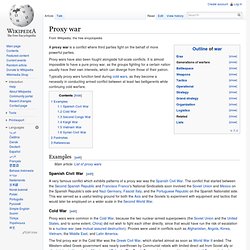
Proxy wars have also been fought alongside full-scale conflicts. It is almost impossible to have a pure proxy war, as the groups fighting for a certain nation usually have their own interests, which can diverge from those of their patron. Examples[edit] Spanish Civil War[edit] Cold War[edit] Proxy wars were common in the Cold War, because the two nuclear-armed superpowers (the Soviet Union and the United States, and to some extent, China) did not wish to fight each other directly, since that would have run the risk of escalation to a nuclear war (see mutual assured destruction).
World Leaders. The Central Intelligence Agency publishes and updates the online directory of Chiefs of State and Cabinet Members of Foreign Governments weekly.
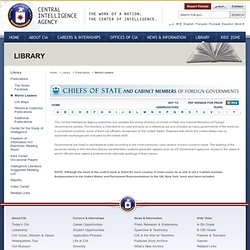
The directory is intended to be used primarily as a reference aid and includes as many governments of the world as is considered practical, some of them not officially recognized by the United States. Regimes with which the United States has no diplomatic exchanges are indicated by the initials NDE. Zach Wahls Speaks About Family. Shin Bet. Sherut haBitaẖon haKlali (Hebrew: שירות הביטחון הכללי, General Security Service), better known by the acronym Shabak (Hebrew: שב״כ, IPA: [ʃaˈbak] ( Organization[edit] Shabak is believed to have three operational wings:[2] The Arab Affairs Department: responsible primarily for Arab related counter-terrorism activities in both Israel and the Palestinian Territories.The Non Arab Affairs Department: responsible for non-Arab security issues and cooperation with foreign security agencies, previously concerned with the Communist Bloc.The Protective Security Department: responsible for protecting high-value individuals and locations in the country such as government officials, embassies, airports, and research facilities.
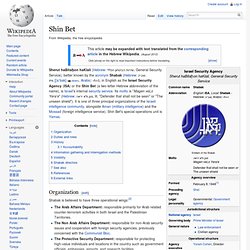
Magocracy. Historical antecedents[edit] The concept of a magus takes its name from the priests of the Magian religion of the ancient Medes, who wielded considerable power and influence, until they were suppressed as a result of a revolt by the pretender Smerdis against Cambyses II.[1] Similarly, Julius Caesar's Commentaries on the Gallic War portrays druids as a learned priestly class and the keepers of customary law, with the power of executing judgments.
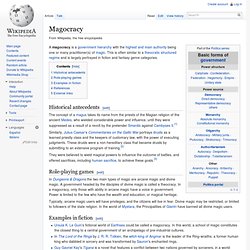
These druids were a non-hereditary class that became druids by submitting to an extensive program of training.[2] They were believed to wield magical powers to influence the outcome of battles, and offered sacrifices, including human sacrifice, to achieve these goals.[3] Role-playing games[edit] Madeleine Albright. Tom Brokaw Explains Canada To Americans. Dead Hand (nuclear war) Dead Hand (Russian: Система «Периметр», Systema "Perimetr", 15Э601),[1] known also as Perimeter,[2] is a Cold-War-era nuclear-control system used by the Soviet Union.
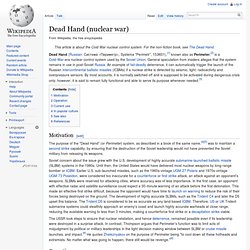
General speculation from insiders alleges that the system remains in use in post-Soviet Russia. An example of fail-deadly deterrence, it can automatically trigger the launch of the Russian intercontinental ballistic missiles (ICBMs) if a nuclear strike is detected by seismic, light, radioactivity and overpressure sensors. By most accounts, it is normally switched off and is supposed to be activated during dangerous crisis only; however, it is said to remain fully functional and able to serve its purpose whenever needed.[3]
Diet of Japan. Composition[edit] The houses of the diet are elected under a parallel voting system.
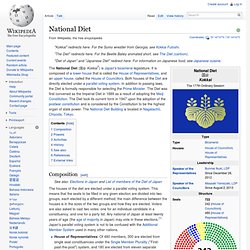
This means that the seats to be filled in any given election are divided into two groups, each elected by a different method; the main difference between the houses is in the sizes of the two groups and how they are elected. Voters are also asked to cast two votes: one for an individual candidate in a constituency, and one for a party list. Any national of Japan at least twenty years of age (the age of majority in Japan) may vote in these elections.[1] Japan's parallel voting system is not to be confused with the Additional Member System used in many other nations. Chrysanthemum Throne. Evin Prison. Evin House of Detention Evin Prison (Persian: زندان اوین Zendān Evin) is a prison in Iran, located in Evin, northwestern Tehran.
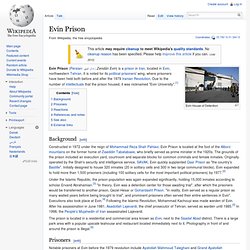
It is noted for its political prisoners' wing, where prisoners have been held both before and after the 1979 Iranian Revolution. Due to the number of intellectuals that the prison housed, it was nicknamed "Evin University".[1] Background[edit] Los Zetas Cartel. Los Zetas (pronounced: [los ˈsetas], Spanish for "The Zs") is a powerful and violent criminal syndicate in Mexico, and is considered by the U.S. government to be the "most technologically advanced, sophisticated, and dangerous cartel operating in Mexico.
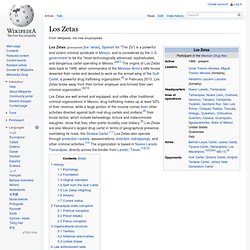
"[6][7] The origins of Los Zetas date back to 1999, when commandos of the Mexican Army's elite forces deserted their ranks and decided to work as the armed wing of the Gulf Cartel, a powerful drug trafficking organization.[8] In February 2010, Los Zetas broke away from their former employer and formed their own criminal organization.[9][10] History[edit] Etymology[edit] Foundation[edit] After Osiel Cárdenas Guillén took full control of the Gulf Cartel in 1999, he found himself in a violent turf war. Polish parliament (expression) "Polish parliament" (Swedish and Norwegian: Polsk riksdag; Danish: Polsk rigsdag; German: Polnischer Reichstag; Dutch: Poolse landdag) is an expression referring to the historical Polish parliaments (Sejm walny).[1] It implies chaos and general disorder, and that no real decision can be reached during sessions.

Any single member of the Polish parliament during the 17th and 18th century had an absolute veto (Latin: liberum veto), meaning that decisions could often only be made with great difficulty. Originally, the procedure was used for technical issues such as points of order, but came to be abused. Today, the expression is mostly used to describe an assembly that is too easy for minorities or individuals to disrupt and/or has too many parties present for meaningful and orderly debate and decision-making to take place. Propaganda. Propaganda is a form of communication aimed towards influencing the attitude of a population toward some cause or position. While the term propaganda has acquired a strongly negative connotation by association with its most manipulative and jingoistic examples (e.g.
Nazi propaganda used to justify the Holocaust), propaganda in its original sense was neutral, and could refer to uses that were generally benign or innocuous, such as public health recommendations, signs encouraging citizens to participate in a census or election, or messages encouraging persons to report crimes to law enforcement, among others. Caudillo. U.S. State Department list of Foreign Terrorist Organizations.